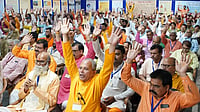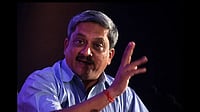It was almost as if the whole world had forgotten pedalling. With his old, trusted Humber bicycle leaning against his right thigh, Otto Stern looked around for the bicycle stand he’d been using for the last several years. The wrought-iron stand was right here last Friday at the Mapusa market, when he’d come here on his weekly shopping trip. But today, in its place was an old tribal woman selling dyed scarves and embroidered sheets neatly laid out on a tarpaulin, over a pile of freshly dug mud heap.
They were building another drain to carry sewage and it cut right across the place where the cycle stand had perched itself for years now. ‘You want… fifty dollars only… take 45 dollars, ok?’ Otto ignored her sales pitch. He’d been to the Mapusa Friday market too often in the last two decades and more to fall for that kind of a swindle. Some miserly but overtly curious tourist landing in Goa in a charter flight from Moscow the week before, might just, he thought.
Otto was really riled today. Over the last decade, the town had lost all its bicycle stands one by one. No one seemed to ride bicycles anymore. This particular bicycle stand was the last one of its kind in that town. It wasn’t something spectacular. Just two thick iron strips running parallel with small, raised arcs welded together between the strips at regular intervals. You fit the bicycle’s front tyre in the gap between the arcs and the bicycle stood as steady as a rock.
Another reason why Otto dearly missed the cycle stand was because he had never fitted his bicycle with one of those regular side stands. It was an old rugged and partly broken Humber bicycle he had picked up from the garage of a neighbour nearly 30 years ago. A man who knew how to work with his hands, Otto had worked on it with a kind of passion, love and affection, he thought, only ageing hippies were capable of. To him, the Humber was his own custom-made chariot of freedom, which he would hang from two wooden pegs jutting out of the outer wall of his home in St Michael’s waddo. Iron pegs caught rust and did not augur well for the bicycle. Wooden pegs had been his choice.
So with no bicycle stand to park his chariot in, Otto leaned it against the side wall of the local fish market, locked it and went about with his purchases. There was much to be bought and stocked for the week. Sprouts, beans, rice, curd, wheat powder, veggies, macaroni, cheese, cereals, which he packed in plain homemade cotton bags and slung them from the bicycle’s handle rod.
Otto heaved his backpack over his shoulders and started pedalling his way back to Anjuna. He passed the Hanuman temple in town, as the road veered left. The temple, an imposing and agonisingly orange structure now, was a lot smaller once and you could actually see the idol of the tailed deity, as you cycled by in the 70s. But times had changed. Grandeur, very often, overshadowed the gods now. Otto paddled harder as he hit the Khorlim incline, which curved a hairpin bend and stretched for nearly a kilometre. After a while, he ritualistically got off and started pushing his load along.
ALSO READ: Love: Man, Women And A Viral Story
Otto’s dreadlocks, unkempt beard and a trademark green singlet and a pair of khaki shorts made him a sight you never could forget. He’d been cycling up and down the Anjuna–Mapusa stretch for nearly 40 years. Underwear-clad children who had stared in awe in the conservative 70s and 80s at this outlandish, gangly cyclist were themselves fathers of school-going children now. These fathers now greeted him with their customary hellos as he went past their homes along the road. But Otto always felt that their children now sneered at him, although he was never sure about it.
Otto knew this road and its characteristics well. He could virtually cycle the entire 10-km distance blindfolded, guided only by the smell of blossoms and the bark of dogs in those particular areas. He knew which mongrel would lurk around the corner near the school at Assagao and nip at his heels on some days when the place was deserted.

As he passed the parijat tree and the heady smell of these white-petalled and orange stemmed flowers wafted across the road, he knew it was time to skirt that biggish pothole and maybe glance left, just in time to see the wizened face of Mr Lobo, a retired school teacher, look up from his newspaper and flash a smile at him. As he cycled by, he knew which tree had the densest canopy, under which he would often rest for a few minutes in summer.
But a lot has changed over the years. And Otto did not need a cycle ride to figure it out. Change had invaded his home too. And he did not know whether it was a good thing or a bad thing or just one of those things that happened to people, which you could do nothing about. As a rebellious teenager Otto, had shifted to Goa following the footsteps of hippies like eight-finger Eddie, who had ended up making Anjuna, their low-strung haven, away from the taut and structured systems of Western Europe.
A German Jew, Otto had found love in another German woman, Ana. Together they had entered this new home at St Michael’s waddo. They had bought the home in the 70s, for a thousand bucks and a Czechoslovakia-made Jawa motorcycle on which he had travelled from Germany to Goa. Motorcycles could be traded for a home in Goa then. Ana loved him and lived with him long enough to bear him two blond sons, after which she packed back for Hamburg. On the morning she left, all Otto got was a note slipped under his pillow, along with the spare key to the house which had been with her. He had then raised Surya, the elder son and Wilhem on his own. Surya was a professional hand and hair model based in Mumbai and Wilhem wanted to become a professional windsurfer and settle in Australia.
He let out a long, sad sigh as his mind went back to Wilhem. Otto was rousted out of his soliloquy when two young boys wearing Liverpool and Manchester United club jerseys, swung dangerously close to him on purpose. He was almost knocked off balance, with all the loads cached in the cloth bags swinging to one side across the bicycle’s handlebar. The boys sped away laughing at their prank. These thin, lanky lads, with underdeveloped muscles and unusually evolved hair crops, riding heavy 200 cc plus motorcycles were now a syndrome of sorts. A common breed in Anjuna and nearby beach areas. With thousands of tourists coming to these areas and drugs easily bought and sold, money was easy to come by for six months during the season. The other six months were spent flaunting stuff that drug money can buy. In his younger days, when he loved loading his chillum with hashish several times a day, drugs were an exception to the village system in Anjuna, largely limited to foreigners and drifters like him. Today, drugs were the system. And the ‘network’ loomed menacingly over everyone. There was rarely any ease or anything languid about smoking a joint now. Everyone was high-wired now.
As he gathered himself and walked the cycle remainder of the distance home, Otto asked himself for the thousandth time about Wilhem. Was he pushing drugs too? Otto stepped out of the bath and started putting all his fresh purchases in place and put the yellow dal and rice on the boil. In the meantime, he sat down at his workstation. He had an order of 20 leather key chains to supply to a leather boutique owner. Otto’s master craft at leather had held him in good stead over the years. With basic tools and an innate artistry, he could carve, chip, and design leather artefacts like key chains, book jackets, sling bags, saddle bags, purses, in no time. And each item he created was handmade, his love for it spread all over.
He finished half-a-dozen key chains before he heard Wilhem’s motorcycle outside. The 20-year-old walked in, and headed straight for his room, ignoring his father. Five minutes later he stormed out, his surfboard tucked under his arm. Otto walked to the door, after his son. “Won’t you stay for lunch? There’s rice and dal and I could make you a Spanish omelette?”
“I don’t have the time, pop. You know I don’t like eating this shit! I won’t be home for dinner. Don’t wait up for me,” Wilhem said straddling his bullet, a swanky brand-new two-seater 500 cc Enfield Bullet classic. That was the first conversation they had in a month. Most days, Wilhem wouldn’t even acknowledge his presence. As the motorcycle sped away and the distinct thump faded out with the increasing distance between the father and son, Otto let out a long sigh and hoped what they said about his son wasn’t true .
Windsurfing wasn’t a paying sport in India yet. And Wilhem’s pocket money had only been a little more than meagre. He worked off and on and never had any kind of regular employment. And yet Wilhem wore the best of clothes, changed motorcycles every few months and always ate out, rarely coming and staying back for a meal. He had rummaged through his room last month and was gutted by guilt when the search yielded nothing incriminating. But the doubts about Wilhem’s source of money lingered. Would he ever find out?
ALSO READ: Theatre Of The Absurd: Reeling In The Droll
Otto thought about the time when Wilhem was the toast of the waddo, as a child. A blonde ball of fun with bluish green eyes, which seemed to take on the colour of the sea off Anjuna beach. Wilhem had taken to the sea like he was born in it. When he was three Otto bought him his first body board. He’d put Wilhem on it and drag it along in waist deep water. That was perhaps where Wilhem first began his romance of surfboarding. Then somehow, somewhere along the way, in the years that passed, he had lost his son and Wilhem saw no need to reach out for the father in Otto.
Otto looked out towards the sea, with his eyes unusually dry. He felt extremely sad, but somehow stopped short of crying. Quietly, he ate the dal and rice along with a piece of mango pickle. And while chewing on the tough mango kernel, he bit his tongue, caught between his teeth. It bled a bit.
(This appeared in the print edition as "Otto’s Dilemma")
(The short story is part of an unpublished collection titled Anjuna Tales)
ALSO READ
Mayabhushan Nagvenkar is a writer and journalist based in Goa



























